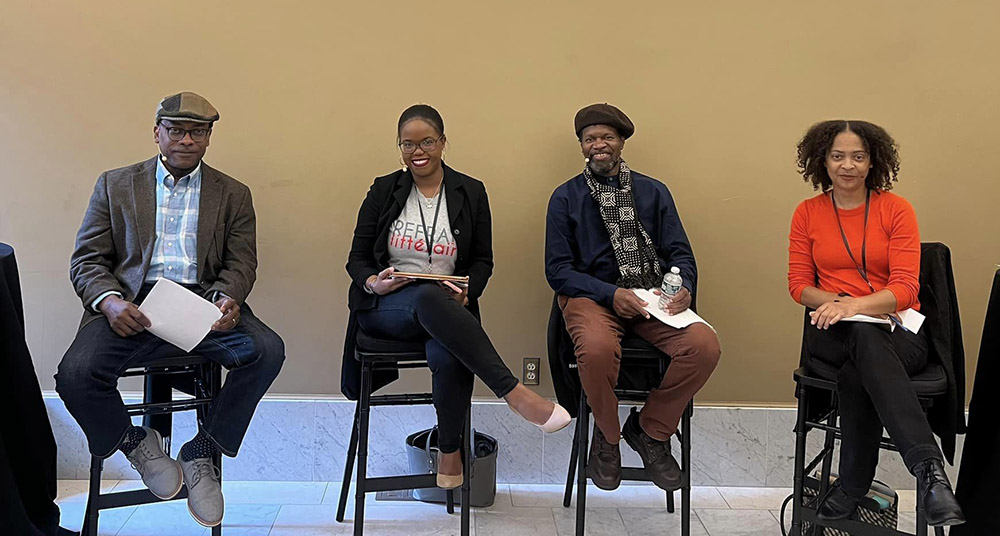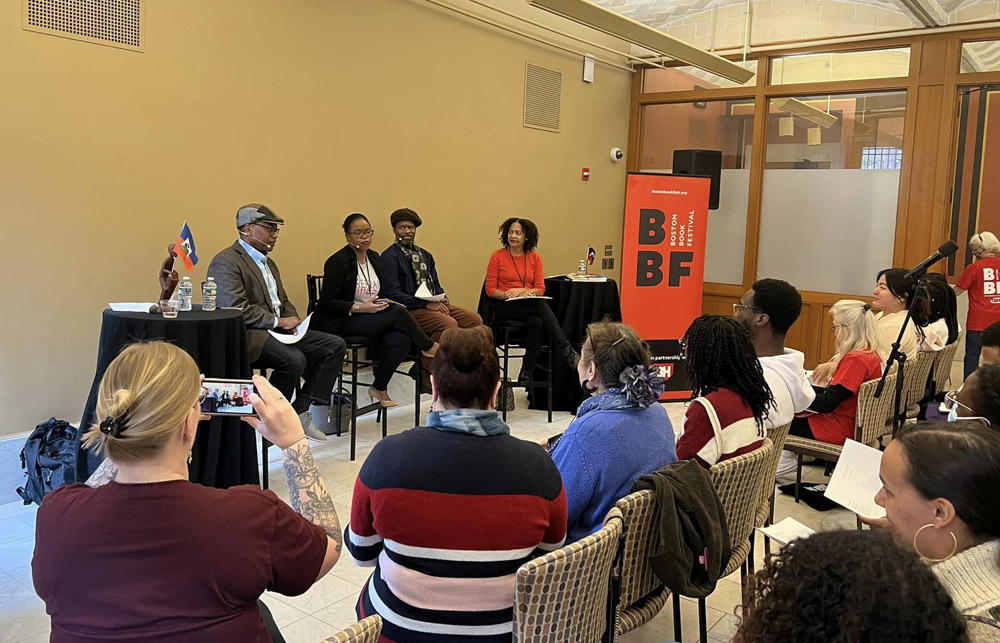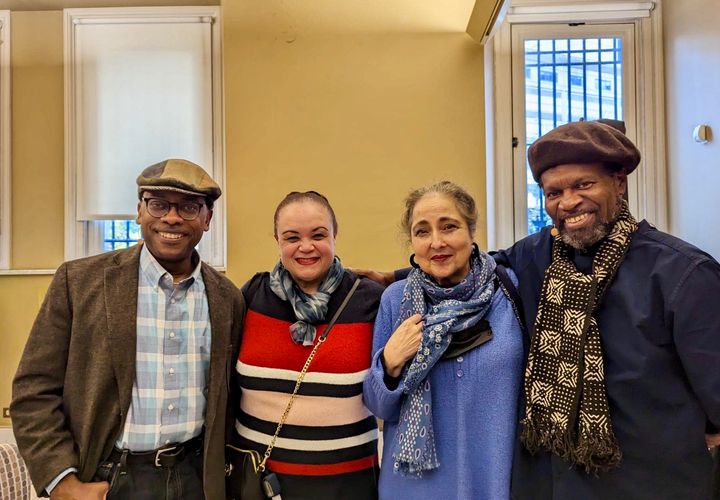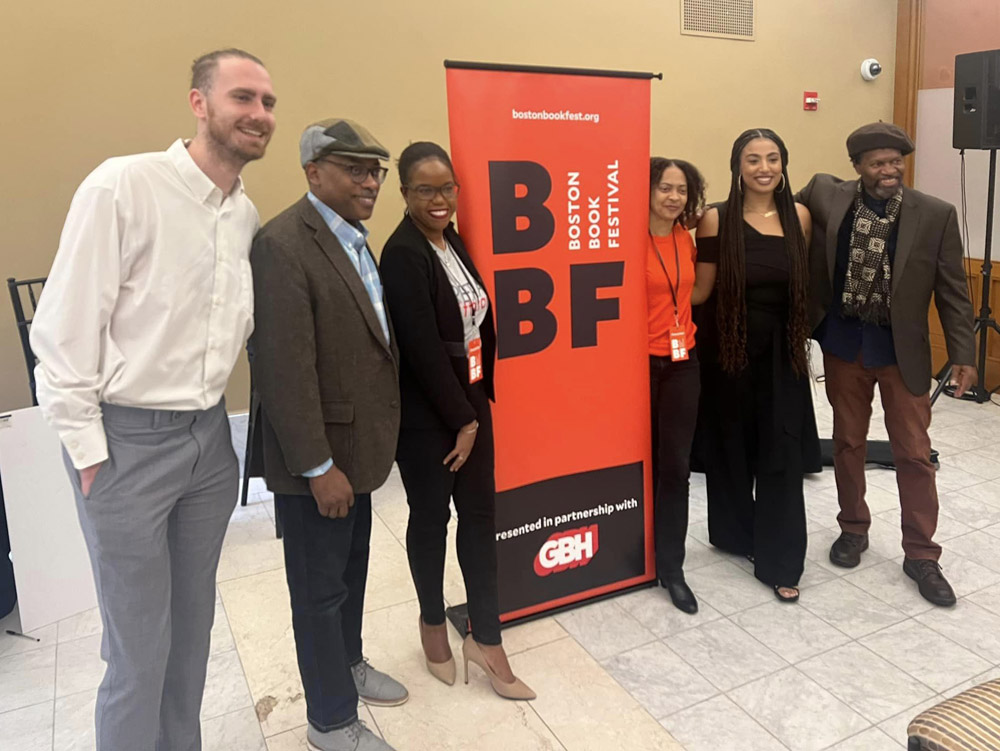I was honored and happy to participate, along with my illustrious co-panelists Danielle Legros Georges, Charlot Lucien, and moderator Milady Auguste, an author in her own right, at the 2023 Boston Book Festival that took place at the historic Boston Public Library in Copley Square, on October 14. We debated the subject “Haitian Literature in the U.S.: The Intersection of Migration and Translation”. After a concise introduction by the acclaimed singer/actor Rebecca Zama, Milady Auguste, the president of Refrain Littéraire, the main sponsor of the presentation, went straight into the theme of our panel, questioning and presenting the three of us in turn. D.L. Georges spoke about the great Franco-Haitian poet Ida Faubert (19th century–beginning of the 20th century), while Charlot Lucien focused his talk on the equally great 20th century Haitian poet Félix Morrisseau-Leroy. This lecture was sponsored by the collective Refrain Littéraire and supported by the Everett Haitian Community Center and the Consulate General of France in Boston. The following article “Translation as Solidarity and Representation” constitutes the totality of my remarks of which, given the constraint of time, I could only share a short version at the Book Festival. The 2023 Boston Book Festival was a great success; our panel on Haitian literature drew an overflow audience who enriched the exchange with dynamic questions.

The panelists, from the left: Charlot Lucien, Milady Auguste, Tontongi & Danielle Legros Georges at the Boston Book Festival on October 14, 2023. —photo Tanbou
In Haiti, nearly 100% of the population communicates by means of a common language—known as Haitian Creole, Kreyòl, or simply and clearly Haitian—that was long considered an illegitimate dialect or jargon.
For most of more than three centuries since its birth on the enslaved Africans’ plantations of Saint-Domingue, Kreyòl was considered inferior, even a non-language. In schools and at formal social events, it was deemed improper to speak Haitian, the violator incurring punishment and public humiliation. This extreme situation has changed somewhat in the last 30 or so years, but much remains to be done for our native language to reach, in Haiti, respectable parity with the hegemonic, colonial languages such as French and English.
From the very day of the foundation of the new nation in January 1804, as the linguist and critic Robert Berrouët-Oriol reminds us, Haitian Kreyòl was “systematically excluded from all administrative apparatus and spaces of the new State: it was excluded from the judicial and administrative texts intended to guide and regulate all economic, social and cultural relations for the sole benefit of the French language, which was also in exclusive use in the first Haitian educational institutions.”1

A partial view of the audience at the Boston Public Library on October 14, 2023. —photo Tanbou
Translation—as with interpretation when speaking—is a recognition that the Other’s language has intellection and communicative value comparable to your own language. This act, in a dialectical way, can convey respect, acknowledgment of the Other’s language as translatable, therefore worthy of acceptability.
The late US-American poet and translator Jack Hirschman has taught us that translation can also be an act of solidarity with the people’s struggle, although, more often it is used for administrative and colonialist purposes, like when Sonthonax translated into Kreyòl the slave emancipation decree of August 29, 1793.
In fact, the best proof that the enslaved Africans’ Creole language had intrinsic legitimacy, even in the eyes of those who denigrated it, was the Creole translation of Napoleon Bonaparte’s proclamation of the invasion of Saint-Domingue in December 1801, an invasion whose covert goal was to reinstate slavery in Saint Domingue, the colonial name of Haiti.
By this unconscious act of colonial insight—the translation of the proclamation—Napoleon revealed that the language of the formerly enslaved was an acceptable and legitimate language for formal communication (even when the established èpistémè of the time considered the Creole language as a non-representable language).
In Nation, Language, and the Ethics of Translation authors Michael Wood and Sandra Bermann write: “Translation’s distinctive ability to offer insight into the language process itself aligns it with ethics and the question of the foreign in a different, though not unrelated, way. As is frequently noted, translation’s etymology—trans (across) and latus, the past participle of ferre (to carry)—suggests a transportation of meaning, a physical displacement.”2 I would add that there is also an emotional displacement in the sense of the emotional connectivity among humans that translation makes possible. Be it written translation of the transcribed word or uttered interpretation of a speech’s meaning, humans’ intercommunication is always a beautiful gesture toward the Other, notwithstanding Napoleon’s translated proclamation announcing his invasion.
To paraphrase Jean-Paul Sartre, the French Existentialist philosopher, who once said that “naming is changing,” I would say that “translating is changing,” changing the otherness of the other not only as “transportation of meaning,” as Sandra Berman suggests, but also as “connection of meanings,” even as facilitator of connection.
Naturally, as we can see in the relation of power between French and Creole in Haiti, other factors can interfere in the linguistic rapport and communication among different peoples, chief among them the politics of social exclusion and economic exploitation.

From left to right: Charlot Lucien, Marie Evangéline Roussel, Jill Netchinsky & Tontongi at the Boston Book Festival on October 14, 2023. —photo Tanbou
An anthology of poetry
For a denigrated language to be taken seriously, its locutors must engage in the project of its valorization and development. One can see the latest embodiment of this valorization process in the release of the trilingual anthology This Land, My Beloved / Tè mwen renmen an / Cette terre, mon amour, edited by Elizabeth Brunazzi, Denizé Lauture and Tontongi, and published by the collective publishing house, Trilingual Press.3
This trilingual anthology places the Haitian language, a long-ostracized language, in validating parity with French and English, creating a true feast of linguistic dance, with diverse intertwined themes that produce, in the end, a harmonious symphony.
The poetry of Haiti, not unlike Haitian cuisine, inherits flavors of Europe, Africa, and the Americas as well as the indigenous spirits of pre-Columbian Ayiti. The Haitian poetic soul, like the soul of Vodou, is multiple, and nourished by a variety of elements both spiritual and existential. This anthology espouses neither one particular line of sensibility, nor one specific ideological manifesto, nor even less one singular school of thought, but rather the poetic expression of the Haitian manifold soul condensed within a single collection, reflecting the evolving feelings and experiences of Haitians, on the island as in the Diaspora.
In a world today where peoples are crushed under the joint assaults of the most dominating and aberrant militarism, as we see in Ukraine, Israel or in occupied Palestine; the question of the normalization of racism and hatred of the Other, as we see in the United States, or in the gangsterization of the State and of life itself, as people are currently experiencing in Haiti; yes, in such dire conditions of human calamities, it is rather astounding that our poets continue to produce, to sing the advent of another reality, to unveil the wealth of our island country Haiti on another order of valuation and determination of what is “rich” and “poor.” Indeed, how can a country that gives birth to such an upsurge of beauty and poetic wonders be called a “poor” country?
Ultimately, there couldn’t have been a better time for the issuing of this anthology which upholds the great capacity for hope, empathy and rebellion the Haitian people are known for. As we speak (October 2023), a big part of Port-au-Prince and many provinces are controlled by violent armed gangs, driven by criminal and predatory intents, maiming, raping, killing as they wish, with impunity and under the passive watch—if not tacit approval—of a weak and corrupt central government that “governs” by decrees, and which is totally illegitimate, taking advantage of the fear and chaos created by the gangs to stay in power.
I have shown in an earlier essay how Haiti played a huge part in the epistemological and practical foundation of our modernity, reminding the world that the rights of Man and Woman are not merely political rights, but also existential rights, rights posed as universal equality and valuation among human beings, respect for their integrity as moral and autonomous agents. The meaning of a human life is measured by factors other than quantitative economic outputs that capitalism is trying to impose as axiomatic truth and finality.
Meaning cannot be defined by what others—or the master—want from you; it is defined by the path you trace for yourself, despite the circumstances. This is a truth that the enslaved Africans of Saint-Domingue knew so well. C.L.R. James showed in his great work on Toussaint Louverture, The Black Jacobins, how the enslaved people of Saint-Domingue navigated two worlds with great dexterity: their own world, and the world of the master.4 They had an intellectual advantage over the slave-holder, because while the master was ignorant of the anguish of their lives, they knew well both worlds, his and their own.

Group photo at the Boston Book Festival on October 14, 2023. From the left: Marceau Crespo, Charlot Lucien, Milady Auguste, Danielle Legros Georges, Rebecca Zama & Tontongi. —photo Tanbou
For another epistemological model of validation
In a country, Haiti, that is today being ripped apart by a conjunction of natural disasters, foreign domination and predatory local governments, a situation has evolved recently to the point where the State government makes tacit agreement with street gangs to maintain control. Where human lives are devalued and can be taken away by assassins at any moment; people leave their families, friends and the comfort of their national habitat to venture to an unknown universe fraught with risks, perils and tragedies.
Poetry and the arts in general confer values that are not measurable in terms of economic gain or social standing—notwithstanding that there are forces who believe that culture is a commodity which should be exploited like all the others.
Regarding Haiti, we should define “wealth and being rich” by a different methodological measure of evaluation and epistemological perspective. For example, compared to most countries in the world, Haiti has historically produced, relative to its population, a considerable number of artists, writers, poets, storytellers, musicians, painters, sculptors, etc. Using that standard and criterion, one should arrive to a different ontological valuation of Having and Being when judging Haiti.
What if you define “wealth and being rich” in terms of human ingenuity and resilience; in terms of validation and intellectual and philosophical realization; in terms of the country’s human potential and the beauty of its lands (despite deforestation and soil pollution)? If you define “wealth and being rich” in terms of the value of the Haitian Revolution in the foundation of our modernity, in terms of both the direct impact of the Revolution on the establishment of liberated nation-states in the Western Hemisphere (among others, aid in the form of arms, money and fighters to the South American liberators Sebastian Francisco de Miranda in 1806, and Simón Bolívar in 1811)—or in terms of Haitian revolution’s positive symbolic reference to the slave plantations in the United States?
If you define “wealth and being rich” in terms of the acquisition, via the 1804 Louisiana Purchase, of nearly half the land of the United States, which Haiti’s pro-independence, anti-slavery revolutionaries forced Napoleon to sell to finance the wars he was waging against England; if you define “wealth and being rich” in terms of the Haitian state’s anti-colonialist stance in world politics, which has benefited countless countries fighting for national independence, including Greece? If you define “wealth and being rich” in terms of the humanism and hospitality of the Haitian people? Yes, if you use these measures instead, Haiti is among the richest countries in the world.
Unfortunately, throughout Haitian history, imperialistic impulses of control by many US and French governments compelled to ally themselves with Haitian dictators and depredatory ruling classes to block the road to Haiti’s legitimate self-determination and liberation. Naturally, the many crises caused by these policies have caused in their turn continual instability, economic dislocations, dependency, mass emigration, etc.
What Haiti really needs today is not Kenyan fighters who have their own problems in Kenya, nor imperialist interference in its affairs, however “humanitarian” one may want to portray it. What Haiti really needs is solidarity for its enormous historical contribution to the liberation struggle of other peoples of the world.
What Haiti needs is for the nation of France to return the equivalent of the 19 billion dollars in gold francs that Haiti paid to France due to the indemnity imposed by Charles X in 1825, an obligation that cost Haiti its entire development project as a young nation—an original sin that continues to affect Haiti until today. Haiti needs support to let her live her dream of liberty, participatory democracy, and international solidarity. Not charity, nor control under the guise of humanitarian intervention.
The theme of this conference on migration and translation supposes encounters among peoples, be they forced or volitional. Haiti being a product of the forced migration through slavery and colonial domination, its language—Haitian Creole—is by its nature the reflection of a multifaceted ancestry, although its syntaxic structure is African.
Indeed, without translation (and quality interpretation) our world would collapse and succumb to mere indifference toward the Other, and even to wars launched due to misunderstanding of a term. In the end, the art of translation is one of the best ways to counter the monolingual hegemony of English, and build a world open to the wonders of another human being’s language and culture.
Homage to Jack Hirschman
In terms of acceptability, the concept of linguistic representation is as potent as that of translation. For, when your language is ostracized and considered inferior in an unjust society, all effort at linguistic representation is a welcome development toward change. For example, by translating Haitian poetry into the dominant language that English has become, the great US-American poet Jack Hirschman showed respect and solidarity with the oppressed Haitian Creole, and in so doing he advocated for representation. Another good, recent example of advocacy for linguistic representation took place in 2021, when the MIT linguist Michel DeGraff and other Haitian Creole advocates such as Charlot Lucien, Lunine Pierre-Jerôme, Hugues Saint-Fort, and this writer, wrote to UNESCO to demand the use of Haitian Creole as well as French in its official proceedings.
In this regard, I would like to pay a personal homage to the poet and translator Jack Hirschman who passed away in August 2021, at his home in San Francisco, California at the age of 87. He was Poet Laureate of San Francisco from 2006 to 2009. He was also a good friend of Haiti and an admirer of Jacques Roumain, the great Haitian novelist and revolutionary.
In the early 1970s, Hirschman was fired from his teaching position at UCLA for encouraging his students to resist the military draft for the Vietnam War, a war which he denounced ferociously. He later became a founding member of the “Jacques Roumain Cultural Brigade,” a political-literary group composed of US-American and Haitian intellectuals such as himself, Boadiba, Paul Laraque, and others who vowed to continue, on the cultural field, the struggle for revolutionary change that Jacques Roumain was leading before his death in 1944 at the age of 37. Roumain was also a close friend of the great US-American and Harlem Renaissance poet Langston Hughes, whom he hosted in Port-au-Prince several times before his premature death.
Hirschman participated in an international symposium commemorating Jacques Roumain’s centennial in 2007, in Port-au-Prince, Haiti. Hirschman, the late professor and literary critic Franck Laraque, and I made the trip to Haiti to participate in this important commemoration. In a cultural event that took place at the French Institute, Hirschman read his translations of Roumain and Paul Laraque’s poetry into English, while I read the Haitian and French versions.
Hirschman was happy to have had this opportunity to come to Haiti; several times before attending the symposium’s plenary meetings, he ran to the downtown area of Port-au-Prince to see, as he put it, “the real Haiti and the real people.” In his public presentation, he spoke of bringing the solidarity of the American people to the Haitian people, an American people, he lamented, who were being exploited by the big corporations. During the poetry reading, he repeated his solidarity with Haiti and thanked the spirits of the Haitian Vodou Lwa for their guidance and wisdom in keeping Haitian resistance alive. The audience responded well to him. In a poem Hirschman wrote, inspired by the symposium, he said: “It’s about time it breathed again, / this time in Haitian. / I was there, I saw it. / No one can come away from it without feeling / there simply has got to be revolution in Haiti.5
—Tontongi, poet, essayist, author most recently of Tyaka Poetica, 2021
Footnotes
| 1. | Robert Berrouët-Oriol, “La cohabitation inégalitaire du créole et du français en Haïti entre janvier 1804 et octobre 1805 : pistes de réflexion”, Rezo Nòdès, October, 11, 2023. [Translated from the French by Berrouët-Oriol and Tontongi.] |
| 2. | Sandra Bermann and Michael Wood, Nation, Language, and the Ethics of Translation (Princeton: Princeton University Press, 2005). |
| 3. | This Land, My Beloved / Tè mwen renmen an / Cette terre, mon amour, edited by Elizabeth Brunazzi, Denizé Lauture and Tontongi (Cambridge: Trilingual Press, 2023). |
| 4. | CLR James, The Black Jacobins: Toussaint L’Ouverture and the San Domingo Revolution (London: Secker & Warburg, 1938). |
| 5. | Jack Hirshman, “The Autozobop Passport Arcane,” Review Tanbou, Spring 2008. |
